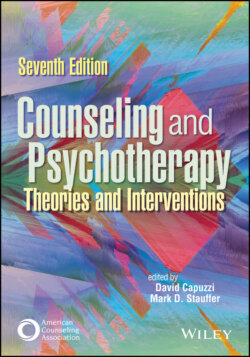Читать книгу Counseling and Psychotherapy - Группа авторов - Страница 109
RCT and Developmental Relational Counseling and Supervision
ОглавлениеDevelopmental relational counseling (DRC) is an integrative model designed to help people move from inaccurate and unproductive perspectives to perspectives that are more compassionate and realistic (Duffey & Haberstroh, 2014). On one hand, the unproductive and disconnecting perspectives people adopt about themselves and others can be seen as being self-aggrandizing and diminishing of others. On the other hand, people can disconnect from themselves and others when they adopt a self-denigrating perspective, whereby they neglect their own relational power.
Based in RCT and influenced by the enneagram personality typology, cognitive theories, and narrative theories, DRC provides a framework by which people can assess their degree of accurate self- and other-awareness, their connection to a range of perspectives that influence how they see themselves and others, and their appropriate or inappropriate use of power. (Duffey et al., 2020, p. 462)
Using a visual representation (Duffey et al., 2020), counselors work with clients to identify their connections to self-aggrandizing, self-denigrating, or clear and balanced perspectives within the varied contexts of their lives. Because DRC is RCT based, counselors explore relational images, strategies of survival, and how a client’s worldview disconnects them from meaningful relationships and mutuality (Duffey et al., 2020).
Using DRC as a framework, we designed a randomized study (Duffey et al., 2016) to evaluate the effects of supervisors who operated from self-denigrating, self-aggrandizing, and clear and balanced perspectives. Using the Relational Health Indices (Liang et al., 2002) as an outcome measure, clients rated the supervisory relationship as highly ineffective when supervisors acted in a self-aggrandizing or self-denigrating manner. The data demonstrated that counseling supervisees attended to the quality of the supervision relationship and appreciated supervisors who were clear and balanced and who relationally connected with supervisees.
